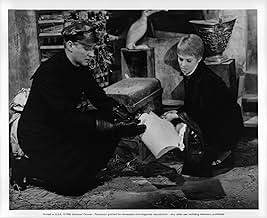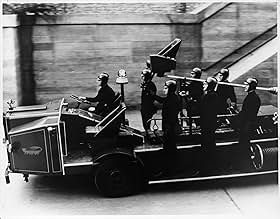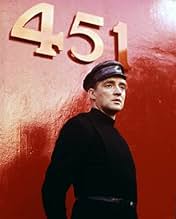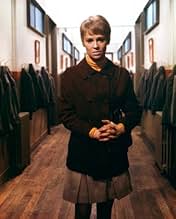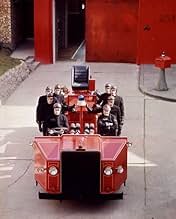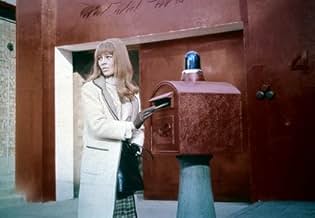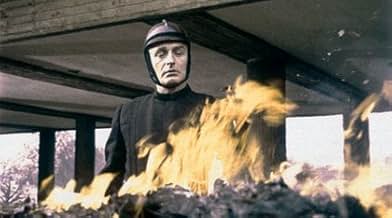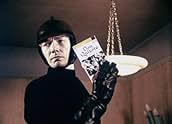IMDb-BEWERTUNG
7,2/10
46.800
IHRE BEWERTUNG
In einer Zukunft voller Unterdrückung beginnt ein Feuerwehrmann, dessen Pflicht die Zerstörung aller Bücher ist, an seiner Aufgabe zu zweifeln.In einer Zukunft voller Unterdrückung beginnt ein Feuerwehrmann, dessen Pflicht die Zerstörung aller Bücher ist, an seiner Aufgabe zu zweifeln.In einer Zukunft voller Unterdrückung beginnt ein Feuerwehrmann, dessen Pflicht die Zerstörung aller Bücher ist, an seiner Aufgabe zu zweifeln.
- Nominiert für 1 BAFTA Award
- 1 Gewinn & 4 Nominierungen insgesamt
Gillian Aldam
- Judoka Woman
- (Nicht genannt)
Michael Balfour
- Book Person: Machiavelli's 'The Prince'
- (Nicht genannt)
Alfie Bass
- Book Person: 'The Prince'
- (Nicht genannt)
Yvonne Blake
- Book Person: 'The Jewish Question'
- (Nicht genannt)
Arthur Cox
- Male Nurse
- (Nicht genannt)
Frank Cox
- Book Person: 'Prejudice'
- (Nicht genannt)
Fred Cox
- Book Person: 'Pride'
- (Nicht genannt)
Noel Davis
- Cousin Midge - TV Personality
- (Nicht genannt)
Judith Drinan
- Book Person - Plato's 'Republic'
- (Nicht genannt)
Kevin Eldon
- Robert - First Schoolboy
- (Nicht genannt)
Empfohlene Bewertungen
Fahrenheit 451" is a strange film, hard to describe. No one could have interpreted the classic Bradbury novel in the same bizarre, fascinating manner as Francois Truffaut. It's a book, and a film, about freedom, choices, individuality, and intellectual repression in a future where books are forbidden; where Firemen are men who start fires...fires in which they burn books.
It was also the first color film directed by Truffaut. Although he by all accounts was not happy about making a color film and found it a bit unsettling, color is used to great effect here; sparingly, except for the extreme shade of red that is seen throughout.
"Fahrenheit 451" is supposed to be the temperature at which book paper catches fire, as the protagonist Guy Montag (Oskar Werner) explains in a scene at the beginning. Guy is a Fireman who seems happy enough with his life until he is approached by a young woman named Clarisse (Julie Christie) on his way home from work one day. She starts up a conversation with him, and the two become friendly. She bewilders him but challenges him to think and feel....and read. And when he arrives home we see his wife (also played by Julie Christie, with long hair), sedated and watching the wallscreen (TV of sorts)...we see what his life is really like, although he had told Clarisse he was "happy"...he is not.
As his friendship with Clarisse grows, he starts to secretly take home, hoard, and read some of the books he finds in the course of his daily work, and as he reads, he becomes obsessed with the books. They become his mistress, and are what finally make him feel affection and warmth. And when he starts to feel and care, so do we.
The two single best scenes are a passionate one involving an old woman who refuses to leave her books, her "children" as she calls them; and the wonderful ending of the film. The countless, painful closeups of books as they are being burned are beautifully done, and difficult to watch.
Truffaut was a well-known disciple of Alfred Hitchcock's films, so when Hitchcock fired his long-time music collaborator Bernard Herrmann during the filming of "Torn Curtain", Truffaut was thrilled to acquire his talents for his own film. The score for "F451" is beautiful, and the film would not be nearly as effective without it.
Writer/producer/director Frank Darabont ("The Green Mile", "The Shawshank Redemption") is working on a new film of "Fahrenheit 451" this year. He says it won't be a remake of the original film.
It was also the first color film directed by Truffaut. Although he by all accounts was not happy about making a color film and found it a bit unsettling, color is used to great effect here; sparingly, except for the extreme shade of red that is seen throughout.
"Fahrenheit 451" is supposed to be the temperature at which book paper catches fire, as the protagonist Guy Montag (Oskar Werner) explains in a scene at the beginning. Guy is a Fireman who seems happy enough with his life until he is approached by a young woman named Clarisse (Julie Christie) on his way home from work one day. She starts up a conversation with him, and the two become friendly. She bewilders him but challenges him to think and feel....and read. And when he arrives home we see his wife (also played by Julie Christie, with long hair), sedated and watching the wallscreen (TV of sorts)...we see what his life is really like, although he had told Clarisse he was "happy"...he is not.
As his friendship with Clarisse grows, he starts to secretly take home, hoard, and read some of the books he finds in the course of his daily work, and as he reads, he becomes obsessed with the books. They become his mistress, and are what finally make him feel affection and warmth. And when he starts to feel and care, so do we.
The two single best scenes are a passionate one involving an old woman who refuses to leave her books, her "children" as she calls them; and the wonderful ending of the film. The countless, painful closeups of books as they are being burned are beautifully done, and difficult to watch.
Truffaut was a well-known disciple of Alfred Hitchcock's films, so when Hitchcock fired his long-time music collaborator Bernard Herrmann during the filming of "Torn Curtain", Truffaut was thrilled to acquire his talents for his own film. The score for "F451" is beautiful, and the film would not be nearly as effective without it.
Writer/producer/director Frank Darabont ("The Green Mile", "The Shawshank Redemption") is working on a new film of "Fahrenheit 451" this year. He says it won't be a remake of the original film.
In a future where books have been outlawed, firemen are paid to burn books instead of put fires out. However, one fireman realizes that what he is doing is wrong and decides to go against the degenerate society he lives in.
I have read reviews of this movie calling it "boring" and "outdated," and frankly I am amazed by how ignorant some people can be. Calling "Fahrenheit 451" outdated simply because the set designs look old and because there are no flashy computer effects shows that you have completely missed the point. The people who made this were not trying to give you a spectacle, they were trying to give you a message - a message that is even more important today than it was when this movie came out.
"Fahrenheit 451" is a fine adaptation of Ray Bradbury's classic novel about censorship. The movie changes many of the book's events, but the spirit of the book is preserved. The cinematography is truly great and the score is quite powerful. The acting is also great. Oskar Werner is right on the money as Montag the fireman. Julie Christie is wonderful playing dual roles as yin and yang: Montag's zombie-like wife, Linda, and Montag's friend, the young and energetic Clarisse. Cyril Cusack is also memorable as the evil Fire Captain Beatty - he isn't a cartoon villain, but a very realistic and human character.
You may think that "Fahrenheit 451" delivers an irrelevant message. You may think that book burning is a thing of the past, a relic of Nazi Germany and Communist Russia. Look around you - book burning happens every day! How do you feel about people trying to ban "The Adventures of Huckleberry Finn" because the word "nigger" is used in it? How about whole sections of "Doctor Dolittle" being rewritten so that they are politically correct? Did you know that school textbooks may not make any mention of Mount Rushmore because it is offensive to a certain Indian tribe? Meanwhile, we are watching our giant-screen TVs and listening to our Walkmans (two inventions that were predicted by Bradbury). We are constantly "plugged in" and never take any time to just sit and think. Look around you - Ray Bradbury's story is coming true. I advise you to watch this movie, and to read the book. (Read the book first. You will appreciate the film more.)
I hear that a remake is in the works. No doubt it will be filled with gaudy special effects and silly Hollywood cliches. I guess I should hold off judgment until I actually see it, but I doubt that it will contain any of the genius that can be found in this sadly underrated gem. It will be interesting to see what they do with the mechanical hound, though....
I have read reviews of this movie calling it "boring" and "outdated," and frankly I am amazed by how ignorant some people can be. Calling "Fahrenheit 451" outdated simply because the set designs look old and because there are no flashy computer effects shows that you have completely missed the point. The people who made this were not trying to give you a spectacle, they were trying to give you a message - a message that is even more important today than it was when this movie came out.
"Fahrenheit 451" is a fine adaptation of Ray Bradbury's classic novel about censorship. The movie changes many of the book's events, but the spirit of the book is preserved. The cinematography is truly great and the score is quite powerful. The acting is also great. Oskar Werner is right on the money as Montag the fireman. Julie Christie is wonderful playing dual roles as yin and yang: Montag's zombie-like wife, Linda, and Montag's friend, the young and energetic Clarisse. Cyril Cusack is also memorable as the evil Fire Captain Beatty - he isn't a cartoon villain, but a very realistic and human character.
You may think that "Fahrenheit 451" delivers an irrelevant message. You may think that book burning is a thing of the past, a relic of Nazi Germany and Communist Russia. Look around you - book burning happens every day! How do you feel about people trying to ban "The Adventures of Huckleberry Finn" because the word "nigger" is used in it? How about whole sections of "Doctor Dolittle" being rewritten so that they are politically correct? Did you know that school textbooks may not make any mention of Mount Rushmore because it is offensive to a certain Indian tribe? Meanwhile, we are watching our giant-screen TVs and listening to our Walkmans (two inventions that were predicted by Bradbury). We are constantly "plugged in" and never take any time to just sit and think. Look around you - Ray Bradbury's story is coming true. I advise you to watch this movie, and to read the book. (Read the book first. You will appreciate the film more.)
I hear that a remake is in the works. No doubt it will be filled with gaudy special effects and silly Hollywood cliches. I guess I should hold off judgment until I actually see it, but I doubt that it will contain any of the genius that can be found in this sadly underrated gem. It will be interesting to see what they do with the mechanical hound, though....
Go figure that I had the privilege of seeing "Fahrenheit 451," for free, on a big screen a few years back (an independent Illinois art house had gotten hold of what was allegedly one of the last surviving prints), and at the time hadn't the foggiest concept of how PRIVILEGED an event it was. Sitting in a theater crowded with college students on a budget with nothing better to do, I watched this diverting little retro item, appreciated its subtlety, nuance, bold visual style, and 'got' the message that if we're not careful, we'll be mindless drones having our desires dictated by The Tube (in current times, that's hardly a profound statement).
Francois Truffaut's adaptation of Ray Bradbury's novel is a bold visual feast that presents a time that might seem 'retrograde' in the eye of a modern pop-culture snob, but ultimately projects what a conceivable 'future' might look like (and not that CGI malarkey served up in "The Matrix"). Interiors of houses are awash in odd colors and give shelter to appliances that don't look dissimilar from our own; TV screens embedded in living-room walls play programs which vacuous housewives interact with sometimes. The film is so relentlessly confident in its appearance that it withstands the test of time.
Though if "Fahrenheit 451" only had its storybook style to rely on, it would fade and be filed away as a mere technical achievement. Truffaut, working from strong source material, concocts a riveting parable about ignorance and the things we, as humans, take for granted. The story follows Guy Montag, an Everyman who is employed as a fireman--a connotation which entails ransacking residences in search of books (reading and writing have been outlawed in this world) and burning them. He has a medicated-smile wife (Julie Christie), a quiet home life, and is in line for a promotion, until a neighbor (Christie again) inspires him to question his motives for working such a sordid job.
One character argues that books cause depression, making people confront unpleasant feelings. "Fahrenheit 451" sometimes runs the risk of lending truth to that statement--in some ways, it is a bleak commentary on civilization, but at the same time grounded in a benevolent humanity that offsets Orwell's brutal, pessimistic world of "1984" (though both texts and films share similar themes). This humanity is underlined in an upbeat, even comic ending (the details of which I won't divulge here).
"Fahrenheit 451" is a spellbinding work of art, in good company with other incendiary works ("A Clockwork Orange" and "Fight Club" come to mind) that have defied the constraints of time and age.
Francois Truffaut's adaptation of Ray Bradbury's novel is a bold visual feast that presents a time that might seem 'retrograde' in the eye of a modern pop-culture snob, but ultimately projects what a conceivable 'future' might look like (and not that CGI malarkey served up in "The Matrix"). Interiors of houses are awash in odd colors and give shelter to appliances that don't look dissimilar from our own; TV screens embedded in living-room walls play programs which vacuous housewives interact with sometimes. The film is so relentlessly confident in its appearance that it withstands the test of time.
Though if "Fahrenheit 451" only had its storybook style to rely on, it would fade and be filed away as a mere technical achievement. Truffaut, working from strong source material, concocts a riveting parable about ignorance and the things we, as humans, take for granted. The story follows Guy Montag, an Everyman who is employed as a fireman--a connotation which entails ransacking residences in search of books (reading and writing have been outlawed in this world) and burning them. He has a medicated-smile wife (Julie Christie), a quiet home life, and is in line for a promotion, until a neighbor (Christie again) inspires him to question his motives for working such a sordid job.
One character argues that books cause depression, making people confront unpleasant feelings. "Fahrenheit 451" sometimes runs the risk of lending truth to that statement--in some ways, it is a bleak commentary on civilization, but at the same time grounded in a benevolent humanity that offsets Orwell's brutal, pessimistic world of "1984" (though both texts and films share similar themes). This humanity is underlined in an upbeat, even comic ending (the details of which I won't divulge here).
"Fahrenheit 451" is a spellbinding work of art, in good company with other incendiary works ("A Clockwork Orange" and "Fight Club" come to mind) that have defied the constraints of time and age.
Perhaps one of the greatest science fiction writers of all time is Ray Bradbury. He was able to look at so many different fantastical things from so many different fantastical angles. Many credit his novel Fahrenheit 451 has his greatest work. It is a book that depicts a future where learning is oppressed and conformity is expected. Government rules with no one ever questioning it. The masses are swayed by what the government wants them to see through television and pills. This adaptation of Bradbury's novel by French auteur Francois Truffault is effective in retaining the heart of Bradbury's work. Oskar Werner plays Guy Montag, a fireman who burns books rather than puts fires out. He is an expert in his field. He can find all the neat, out-of-the-way places people hide their books like in toasters or behind TV picture tubes. Books are outlawed as seen as corrupting forces in society. Only picture books are allowed. Montag goes on with his mundane life with his wife who is always watching television. The status of one is determined by how many TVs you have in the house. Montag doesn't like TV and has an undeniable quench for something more. Anyway, he meets a neighbor like him in spirit and soon decides to start reading. I loved this film because its message is so very clear today and so scary as we live in a society very different from Montag's yet not so far away. TV dominates our lives to some degree. Most of our news comes from it. Much of our bias comes from it. It is definitely a defining instrument in our lives whether or not we wish to admit it. Reading some argue is in a massive decline and our standards as a society certainly have much lower expectations as to what people should know. If you doubt this, just look at a show from the 1960s(even a show like Bewitched or Gilligan's Island) and compare the vocabulary to something made for a similarly aged viewing audience. We dumb down everything. Anyway enough sermonizing, Farenheit 451 will get your mind thinking. Truffault creates plenty of suspense and a wonderfully eerie new future. His use of color in particular really impressed me. It is of course the 60s, but he makes his world look very different. The acting is very good. Werner gives a more than competent performance as a man troubled with a life he finds to be false. Julie Christie excels playing BOTH Werner's wife and the neighbor girl that inspires him to find the true self. I also enjoyed a rare turn by crusty Cyril Cusak! This is indeed an underrated science fiction film and more importantly a film that should be explored as we move closer and closer to that society it showcases. Fortunately for all of us here, we understand the power, the joy, the fulfillment that reading and writing bring us each day. One last note(or two): this was Truffault's first film in English(may be his only one?) and the ending was wonderfully done!
Ray Bradbury's disturbing vision of a possible future comes vividly alive in this film adaption of Fahrenheit 451. Reading for pleasure is now banned although I imagine you must have a certain degree of literacy to read food can labels and directions to operate all kinds of machinery. But read for enjoyment or for education about the world beyond the small space of earth you frequent, that's a big no-no in this future America.
Oskar Werner stars in Fahrenheit 451, he plays a fireman who have a different function in this society. Buildings and such are now fireproof so fireman have become the enforcers of the ban against books. They seek and burn books in whatever quantities they find. A good job in a police state, but not a good one if you have an inquiring mind such as Werner has.
Julie Christie plays two roles, Werner's pleasure driven wife and a schoolteacher whose unorthodox for that society's teaching methods have brought her under scrutiny. She does a good job in both characterizations.
Bradbury's themes are grounded in reality. Looking at American history it was a crime in many slave holding states to educate a slave. Let them be happy in their ignorance and they might not get ideas about a better life and won't rebel.
But this is a society that's beyond that kind of formal slavery so the answer is the old Roman one of bread&circuses. The circus in this case is television which has evolved into an interactive medium. The vast wasteland that Newton Minow characterized television as back in the day has gone beyond anything Minow was having visions about. Entertainment has really dumbed down and the circuses aren't too far from what used to entertain the Romans.
In the supporting cast you will remember Cyril Cusack as the fire brigade captain who functions as the spokesman for this new world and Bee Duffring as the book lady who martyrs herself for knowledge in an unforgettable scene.
The ending is not Bradbury's, but one written by director Francois Truffaut. It is very much however in the spirit of the novel and a tribute to mankind's unquenchable thirst for knowledge. Don't miss Fahrenheit 451 when broadcast.
Oskar Werner stars in Fahrenheit 451, he plays a fireman who have a different function in this society. Buildings and such are now fireproof so fireman have become the enforcers of the ban against books. They seek and burn books in whatever quantities they find. A good job in a police state, but not a good one if you have an inquiring mind such as Werner has.
Julie Christie plays two roles, Werner's pleasure driven wife and a schoolteacher whose unorthodox for that society's teaching methods have brought her under scrutiny. She does a good job in both characterizations.
Bradbury's themes are grounded in reality. Looking at American history it was a crime in many slave holding states to educate a slave. Let them be happy in their ignorance and they might not get ideas about a better life and won't rebel.
But this is a society that's beyond that kind of formal slavery so the answer is the old Roman one of bread&circuses. The circus in this case is television which has evolved into an interactive medium. The vast wasteland that Newton Minow characterized television as back in the day has gone beyond anything Minow was having visions about. Entertainment has really dumbed down and the circuses aren't too far from what used to entertain the Romans.
In the supporting cast you will remember Cyril Cusack as the fire brigade captain who functions as the spokesman for this new world and Bee Duffring as the book lady who martyrs herself for knowledge in an unforgettable scene.
The ending is not Bradbury's, but one written by director Francois Truffaut. It is very much however in the spirit of the novel and a tribute to mankind's unquenchable thirst for knowledge. Don't miss Fahrenheit 451 when broadcast.
Wusstest du schon
- WissenswertesThe film's credits are spoken, not read, in keeping with the film's theme of destruction of reading material.
- PatzerAfter Montag comes out of the first raid to burn the books, the placement of the fire protective clothing (helmet and gloves) are unnatural movements and appear to be a reverse run of film footage. This is further compounded by the fact that he walks backwards to get the flamethrower which has flame entering the nozzle instead of leaving the nozzle.
- Zitate
Guy Montag: To learn how to find, one must first learn how to hide.
- Crazy CreditsThe beginning credits are spoken instead of written on the screen.
- Alternative VersionenOriginally Noel Davis (who plays Cousin Midge) did the opening voice over. In the current version it is done by Alex Scott ("The Life of Henry Brulard" Book Person).
Top-Auswahl
Melde dich zum Bewerten an und greife auf die Watchlist für personalisierte Empfehlungen zu.
- How long is Fahrenheit 451?Powered by Alexa
Details
- Erscheinungsdatum
- Herkunftsland
- Offizielle Standorte
- Sprachen
- Auch bekannt als
- Farenhajt 451
- Drehorte
- Produktionsfirmen
- Weitere beteiligte Unternehmen bei IMDbPro anzeigen
Box Office
- Budget
- 1.500.000 $ (geschätzt)
- Bruttoertrag in den USA und Kanada
- 509 $
- Eröffnungswochenende in den USA und in Kanada
- 11.206 $
- 25. Apr. 1999
- Weltweiter Bruttoertrag
- 581 $
- Laufzeit
- 1 Std. 52 Min.(112 min)
- Seitenverhältnis
- 1.66 : 1
Zu dieser Seite beitragen
Bearbeitung vorschlagen oder fehlenden Inhalt hinzufügen


